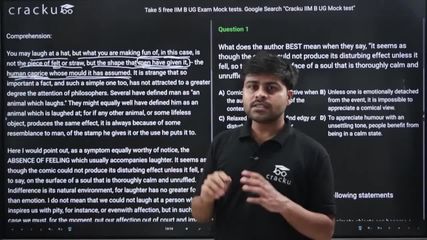Comprehension:
You may laugh at a hat, but what you are making fun of, in this case, is not the piece of felt or straw, but the shape that men have given it, -- the human caprice whose mould it has assumed. It is strange that so important a fact, and such a simple one too, has not attracted to a greater degree the attention of philosophers. Several have defined man as "an animal which laughs." They might equally well have defined him as an animal which is laughed at; for if any other animal, or some lifeless object, produces the same effect, it is always because of some resemblance to man, of the stamp he gives it or the use he puts it to.
Here I would point out, as a symptom equally worthy of notice, the ABSENCE OF FEELING which usually accompanies laughter. It seems as though the comic could not produce its disturbing effect unless it fell, so to say, on the surface of a soul that is thoroughly calm and unruffled. Indifference is its natural environment, for laughter has no greater foe than emotion. I do not mean that we could not laugh at a person who inspires us, with pity, for instance, or even with affection, but in such a case we must, for the moment, put our affection out of court and impose silence upon our pity. In a society composed of pure intelligences there would probably be no more tears, though perhaps there would still be laughter; whereas highly emotional souls, in tune and unison with life, in whom every event would be sentimentally prolonged and re-echoed, would neither know nor understand laughter. Try, for a moment, to become interested in everything that is being said and done; act, in imagination, with those who act, and feel with those who feel; in a word, give your sympathy its widest expansion: as though at the touch of a fairy wand you will see the flimsiest of objects assume importance, and a gloomy hue spread over everything. Now step aside, look upon life as a disinterested spectator: many a drama will turn into a comedy. It is enough for us to stop our ears to the sound of music, in a room where dancing is going on, for the dancers at once to appear ridiculous. How many human actions would stand a similar test? Should we not see many of them suddenly pass from grave to gay, on isolating them from the accompanying music of sentiment? To produce the whole of its effect, then, the comic demands something like a momentary anesthesia of the heart. Its appeal is to intelligence, pure and simple.
Solution
Let's look at each option individually:
Option A: This is what the entire penultimate paragraph builds towards, that comedy works when one is indifferent and not close to the situation being laughed at. Hence, this statement can be inferred.
Option B: This is what the first paragraph talks about. A hat is laughed at because of the traits humans have given it and what human characteristics it resembles; no squirrel is laughing at a "hat"; hence, this too can be inferred.
Option C: While this might seem like an extreme option, this is what the passage conveys, "In a society composed of pure intelligences there would probably be no more tears, though perhaps there would still be laughter; whereas highly emotional souls, in tune and unison with life, in whom every event would be sentimentally prolonged and re-echoed, would neither know nor understand laughter." Hence, this, too, can be inferred.
Option D: Similar to option B, this can be inferred from the passage's first paragraph. "...if any other animal, or some lifeless object, produces the same effect, it is always because of some resemblance to man, of the stamp he gives it or the use he puts it to." Hence, this too can be inferred from the passage.
Option E: Although the penultimate paragraph has the line: "To produce the whole of its effect, then, the comic demands something like a momentary anesthesia of the heart." The options distort it by omitting the heart; it is not that we need actual anaesthesia but that we need to put our feelings and pity on hold.
Hence, of all the given statements only option E can not be inferred and would be the correct answer.
Video Solution

Click on the Email ☝️ to Watch the Video Solution
Create a FREE account and get:
- All Quant Formulas and shortcuts PDF
- 15 XAT previous papers with solutions PDF
- XAT Trial Classes for FREE
